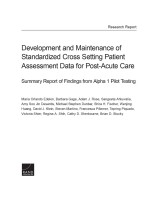| 来源类型 | Research Reports
|
| 规范类型 | 报告
|
| DOI | https://doi.org/10.7249/RR1895
|
| 来源ID | RR-1895-CMS
|
| Development and Maintenance of Standardized Cross Setting Patient Assessment Data for Post-Acute Care: Summary Report of Findings from Alpha 1 Pilot Testing |
| Maria Orlando Edelen; Barbara J. Gage; Adam J. Rose; Sangeeta C. Ahluwalia; Amy Soo Jin DeSantis; Michael Stephen Dunbar; Shira H. Fischer; Wenjing Huang; David J. Klein; Steven Martino; et al.
|
| 发表日期 | 2017
|
| 出版年 | 2017
|
| 页码 | 127
|
| 语种 | 英语
|
| 结论 |
Patient/Resident Factors- When patients/residents were cognitively impaired or fatigued, it was noticeably more difficult to complete the assessment.
Staff Experience with the Assessment- Many research nurses stated that facility staff members became more fluid with the assessment as they gained practice.
- Conversely, when facility staff members had not done an assessment recently, they found it more difficult.
- Debriefing after interviews to discuss challenges and questions had been helpful in improving skills.
Technical Glitches- The research nurses commented that sometimes questions would be skipped accidentally because pages would stick together or facility staff would skip the "testing only" items.
- One pair of assessors mitigated these errors by asking each other at the end of a section if there was anything else they needed to cover.
Skill with Electronic Health Record (EHR) Use- Research nurses highlighted the importance of easy access to the EHR. Those who needed assistance said it created extra hassle and scheduling, and often felt rushed while searching it because someone else was involved in the process.
Challenge of Timing Each Section Separately- Research nurses shared that it was difficult to time each section separately. After a section had been completed, additional information frequently arose. However, this is unique to the testing phase and will not be a problem when these items are actually in use.
Difficulty Finding Family Members- Several research nurses noted that it was often difficult to find family members if they were not in the room, which made answering caregiver response items difficult.
|
| 摘要 |
- The first category assessed in Alpha 1 testing, which included depressed mood, pain, and bladder and bowel continence, worked nearly perfectly: The items were both reliable and feasible to implement. They will require little if any modification and can proceed to Beta testing in their current form.
- The second category — for vision and hearing, cognitive status, and care preferences — evidenced minor issues with reliability or feasibility. Some of the items in these content areas will require minor adjustments, and they may need to be retested in the Alpha 2 phase to prepare them for Beta testing.
- The third category, which consisted of medication reconciliation, was being tested for the first time. Not surprisingly, the medication reconciliation items demonstrated the most limitations with respect to reliability and feasibility. This content area will require considerable refinement and retesting in the Alpha 2 phase to prepare for Beta testing.
|
| 主题 | Functional Status
; Health Care Facilities
; Health Care Program Evaluation
; Health Care Quality
; Medicare
; Nurses and Nursing
; Patient Experience
|
| URL | https://www.rand.org/pubs/research_reports/RR1895.html
|
| 来源智库 | RAND Corporation (United States)
|
| 引用统计 |
|
| 资源类型 | 智库出版物
|
| 条目标识符 | http://119.78.100.153/handle/2XGU8XDN/108514
|
推荐引用方式
GB/T 7714 |
Maria Orlando Edelen,Barbara J. Gage,Adam J. Rose,et al. Development and Maintenance of Standardized Cross Setting Patient Assessment Data for Post-Acute Care: Summary Report of Findings from Alpha 1 Pilot Testing. 2017.
|
|
文件名:
|
x1495316863743.jpg
|
|
格式:
|
JPEG
|

|
文件名:
|
RAND_RR1895.pdf
|
|
格式:
|
Adobe PDF
|
除非特别说明,本系统中所有内容都受版权保护,并保留所有权利。